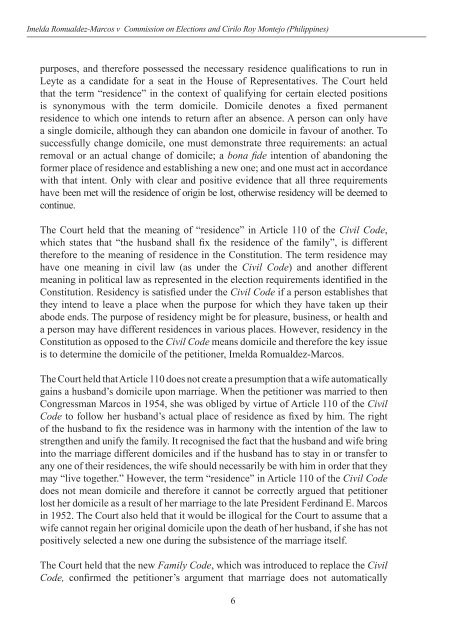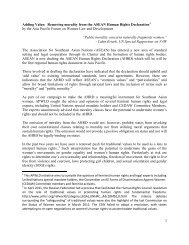A Digest of Case Law on the Human Rights of Women - Asia Pacific ...
A Digest of Case Law on the Human Rights of Women - Asia Pacific ...
A Digest of Case Law on the Human Rights of Women - Asia Pacific ...
Create successful ePaper yourself
Turn your PDF publications into a flip-book with our unique Google optimized e-Paper software.
Imelda Romualdez-Marcos v Commissi<strong>on</strong> <strong>on</strong> Electi<strong>on</strong>s and Cirilo Roy M<strong>on</strong>tejo (Philippines)<br />
purposes, and <strong>the</strong>refore possessed <strong>the</strong> necessary residence qualificati<strong>on</strong>s to run in<br />
Leyte as a candidate for a seat in <strong>the</strong> House <str<strong>on</strong>g>of</str<strong>on</strong>g> Representatives. The Court held<br />
that <strong>the</strong> term “residence” in <strong>the</strong> c<strong>on</strong>text <str<strong>on</strong>g>of</str<strong>on</strong>g> qualifying for certain elected positi<strong>on</strong>s<br />
is syn<strong>on</strong>ymous with <strong>the</strong> term domicile. Domicile denotes a fixed permanent<br />
residence to which <strong>on</strong>e intends to return after an absence. A pers<strong>on</strong> can <strong>on</strong>ly have<br />
a single domicile, although <strong>the</strong>y can aband<strong>on</strong> <strong>on</strong>e domicile in favour <str<strong>on</strong>g>of</str<strong>on</strong>g> ano<strong>the</strong>r. To<br />
successfully change domicile, <strong>on</strong>e must dem<strong>on</strong>strate three requirements: an actual<br />
removal or an actual change <str<strong>on</strong>g>of</str<strong>on</strong>g> domicile; a b<strong>on</strong>a fide intenti<strong>on</strong> <str<strong>on</strong>g>of</str<strong>on</strong>g> aband<strong>on</strong>ing <strong>the</strong><br />
former place <str<strong>on</strong>g>of</str<strong>on</strong>g> residence and establishing a new <strong>on</strong>e; and <strong>on</strong>e must act in accordance<br />
with that intent. Only with clear and positive evidence that all three requirements<br />
have been met will <strong>the</strong> residence <str<strong>on</strong>g>of</str<strong>on</strong>g> origin be lost, o<strong>the</strong>rwise residency will be deemed to<br />
c<strong>on</strong>tinue.<br />
The Court held that <strong>the</strong> meaning <str<strong>on</strong>g>of</str<strong>on</strong>g> “residence” in Article 110 <str<strong>on</strong>g>of</str<strong>on</strong>g> <strong>the</strong> Civil Code,<br />
which states that “<strong>the</strong> husband shall fix <strong>the</strong> residence <str<strong>on</strong>g>of</str<strong>on</strong>g> <strong>the</strong> family”, is different<br />
<strong>the</strong>refore to <strong>the</strong> meaning <str<strong>on</strong>g>of</str<strong>on</strong>g> residence in <strong>the</strong> C<strong>on</strong>stituti<strong>on</strong>. The term residence may<br />
have <strong>on</strong>e meaning in civil law (as under <strong>the</strong> Civil Code) and ano<strong>the</strong>r different<br />
meaning in political law as represented in <strong>the</strong> electi<strong>on</strong> requirements identified in <strong>the</strong><br />
C<strong>on</strong>stituti<strong>on</strong>. Residency is satisfied under <strong>the</strong> Civil Code if a pers<strong>on</strong> establishes that<br />
<strong>the</strong>y intend to leave a place when <strong>the</strong> purpose for which <strong>the</strong>y have taken up <strong>the</strong>ir<br />
abode ends. The purpose <str<strong>on</strong>g>of</str<strong>on</strong>g> residency might be for pleasure, business, or health and<br />
a pers<strong>on</strong> may have different residences in various places. However, residency in <strong>the</strong><br />
C<strong>on</strong>stituti<strong>on</strong> as opposed to <strong>the</strong> Civil Code means domicile and <strong>the</strong>refore <strong>the</strong> key issue<br />
is to determine <strong>the</strong> domicile <str<strong>on</strong>g>of</str<strong>on</strong>g> <strong>the</strong> petiti<strong>on</strong>er, Imelda Romualdez-Marcos.<br />
The Court held that Article 110 does not create a presumpti<strong>on</strong> that a wife automatically<br />
gains a husband’s domicile up<strong>on</strong> marriage. When <strong>the</strong> petiti<strong>on</strong>er was married to <strong>the</strong>n<br />
C<strong>on</strong>gressman Marcos in 1954, she was obliged by virtue <str<strong>on</strong>g>of</str<strong>on</strong>g> Article 110 <str<strong>on</strong>g>of</str<strong>on</strong>g> <strong>the</strong> Civil<br />
Code to follow her husband’s actual place <str<strong>on</strong>g>of</str<strong>on</strong>g> residence as fixed by him. The right<br />
<str<strong>on</strong>g>of</str<strong>on</strong>g> <strong>the</strong> husband to fix <strong>the</strong> residence was in harm<strong>on</strong>y with <strong>the</strong> intenti<strong>on</strong> <str<strong>on</strong>g>of</str<strong>on</strong>g> <strong>the</strong> law to<br />
streng<strong>the</strong>n and unify <strong>the</strong> family. It recognised <strong>the</strong> fact that <strong>the</strong> husband and wife bring<br />
into <strong>the</strong> marriage different domiciles and if <strong>the</strong> husband has to stay in or transfer to<br />
any <strong>on</strong>e <str<strong>on</strong>g>of</str<strong>on</strong>g> <strong>the</strong>ir residences, <strong>the</strong> wife should necessarily be with him in order that <strong>the</strong>y<br />
may “live toge<strong>the</strong>r.” However, <strong>the</strong> term “residence” in Article 110 <str<strong>on</strong>g>of</str<strong>on</strong>g> <strong>the</strong> Civil Code<br />
does not mean domicile and <strong>the</strong>refore it cannot be correctly argued that petiti<strong>on</strong>er<br />
lost her domicile as a result <str<strong>on</strong>g>of</str<strong>on</strong>g> her marriage to <strong>the</strong> late President Ferdinand E. Marcos<br />
in 1952. The Court also held that it would be illogical for <strong>the</strong> Court to assume that a<br />
wife cannot regain her original domicile up<strong>on</strong> <strong>the</strong> death <str<strong>on</strong>g>of</str<strong>on</strong>g> her husband, if she has not<br />
positively selected a new <strong>on</strong>e during <strong>the</strong> subsistence <str<strong>on</strong>g>of</str<strong>on</strong>g> <strong>the</strong> marriage itself.<br />
The Court held that <strong>the</strong> new Family Code, which was introduced to replace <strong>the</strong> Civil<br />
Code, c<strong>on</strong>firmed <strong>the</strong> petiti<strong>on</strong>er’s argument that marriage does not automatically<br />
6



